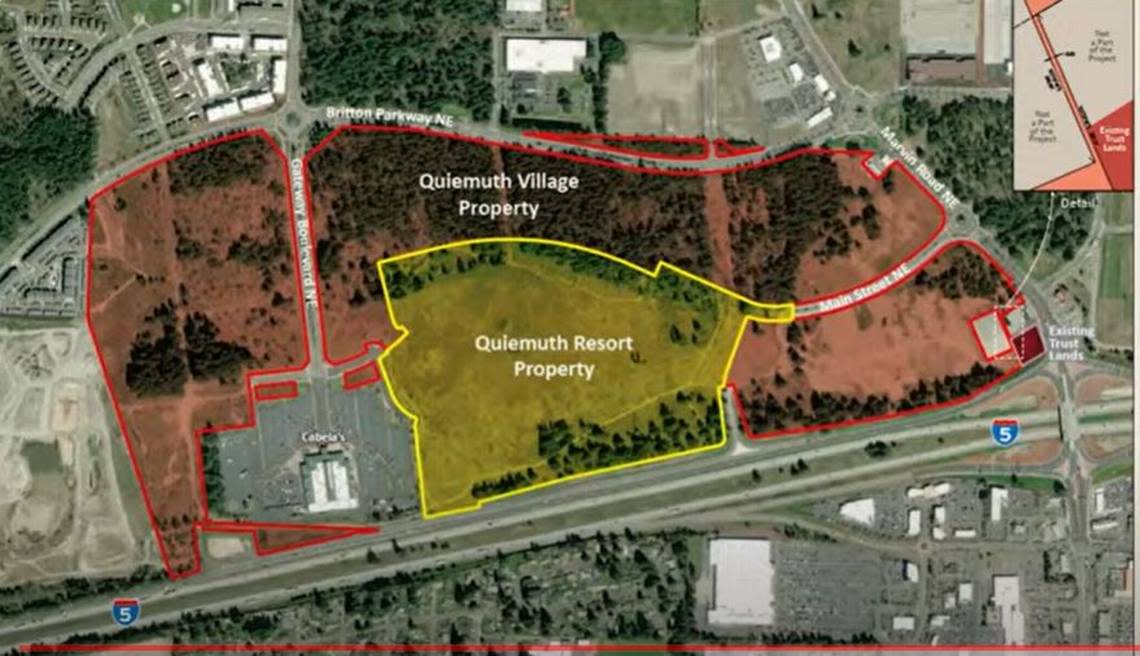Nisquallys unveil sweeping development plan for its land in Lacey near Cabela’s

Nisqually tribal representatives have unveiled their plans for land the tribe owns near the outdoors store Cabela’s, and those plans include a 155,000-square-foot casino and a 350-room hotel.
In addition to the casino-resort, which the tribe is calling the Quiemuth Resort (pronounced kway-mooth), there’s also Quiemuth Village, a mixed-use development proposal.
The Nisquallys own the 250-acre parcel that surrounds Cabela’s. It is north of I-5, west of Marvin Road Northeast and south of Britton Parkway.
Both development proposals were presented to the Lacey City Council Thursday evening by Nisqually representatives, including tribal Chairman Willie Frank III.
“This is a huge project for Nisqually,” he said, adding that there has been a lot of conversation over the years about what the land near Cabela’s might become.
“The Nisqually tribe is in a good place right now to move forward together with the city of Lacey to really develop something that’s going to benefit the city for the next seven generations,” Frank said.
Not only the city, but also the tribe and Thurston County will benefit from jobs and other opportunities, he said.
In addition to the casino and hotel, Quiemuth Resort will have 42,000 square feet of food and beverage space, an entertainment and meeting space, and a cultural center.
Two possibilities were outlined for Quiemuth Village.
One option is a commercial-heavy mixed-use development that in addition to housing could feature a neighborhood grocery store and family entertainment in the form of movie theaters, bowling alleys, or a go-kart track, as well as big box retail, a golf driving range and a potential car dealership.
The other possibility is a recreation-heavy mixed-use development that would have housing, an indoor sports complex and a school.
After the presentation, the council voted unanimously to authorize the city manager to sign a cooperation agreement with the tribe to “address the development and mitigate potential impacts to the city,” said city attorney Dave Schneider.
The overall agreement spells out the need for future agreements, including:
▪ The provision of emergency services to the development, including mutual aid response by emergency service providers.
▪ The coordination and payment of actual costs related to law enforcement, prosecution, public defense, court administration, jail services, and similar services.
▪ The coordination, design and maintenance of water supply, sewer collection and wastewater services, if requested. The agreement also establishes that all roads within the project will be owned and maintained by the tribe.
▪ The tribe and city also agree to meet and address concerns regarding the compatibility of land use, signage and view corridors within and outside the perimeter of the properties, including the frontage along I-5.
▪ The agreement, too, states the properties will be designated as “Compact Covered Areas” under the tax-sharing compact agreed to by the tribe and the state in 2021. Under the compact, the state would share state retail taxes and certain state business and occupation taxes resulting from all non-tribal member to non-tribal member retail establishment transactions.
The Nisqually Tribe also intends to administer all permitting on the properties which will be subject to the tribe’s building codes and other tribal laws, according to the city. However, City Attorney Schneider said the two parties would meet and discuss permitting so that it squares with city code.
Schneider said the tribe agrees to reimburse the city for any and all of the actual costs and impacts borne by the city in providing services to the area.
So when does work on the development begin? It won’t for some time because the tribe first has to work with the federal government to put the land into trust. That could take up to four years, Chairman Frank has previously said.
The council did not ask any questions about the proposals, but Mayor Andy Ryder shared a few thoughts about the moment.
“Boy, this is a long time in coming,” he said about the vacant land, recalling the days when he used to ride a motorcycle through the area or go stomping down trails.
“The planning has been there for this area for a very, very long time,” Ryder said. “For the tribe to pick this up and see it through its vision means a lot. Thank you to the tribe.”
Nisqually Tribe intends to develop village, resort on land it owns near Cabela’s in Lacey

